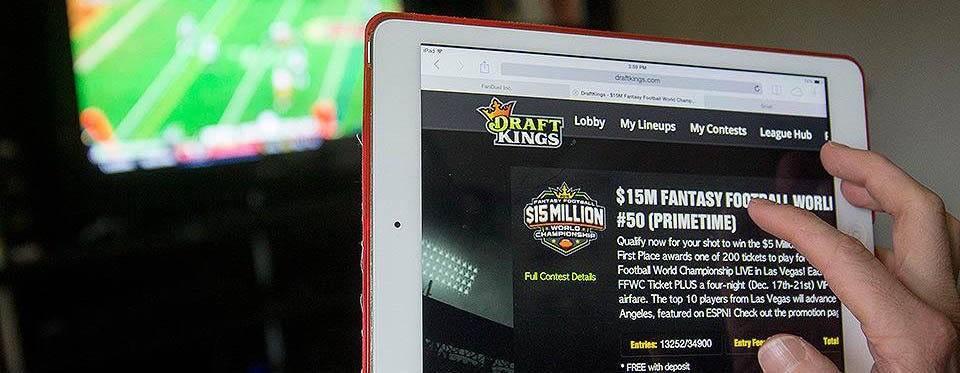How To Make A Living Playing Fantasy Sports
Stacking—loading up your lineup with players from one team—is a huge strategy in daily fantasy baseball. You can find the team (s) to stack with by looking at which games oddsmakers see as the. “A select few can make a living writing about fantasy sports, but I don’t think they’re making near the money that the daily fantasy sports players are,” he said. “I’m a good player.
The new European data protection law requires us to inform you of the following before you use our website:
We use cookies and other technologies to customize your experience, perform analytics and deliver personalized advertising on our sites, apps and newsletters and across the Internet based on your interests. By clicking “I agree” below, you consent to the use by us and our third-party partners of cookies and data gathered from your use of our platforms. See our Privacy Policy and Third Party Partners to learn more about the use of data and your rights. You also agree to our Terms of Service.
There are lots of reasons to try daily fantasy sports betting. It has several advantages over traditional season-long fantasy sports, and even over other popular forms of gambling. Playing daily fantasy sports is not particularly time consuming, and it offers you a chance to win money on a consistent basis. More Daily Fantasy Sports Tips. Here are some more tips to build your Daily Fantasy Sports skills and win money. Play within your comfort zone. The beauty about Daily Fantasy Sports is you choose your entry fee, you choose your sport, you choose your game type, etc. Whether it's low or high stakes, play smart and pace yourself for a full season. Off-work hobbies like fantasy football used to be relegated to the basement of your neighbor’s house. Nowadays, playing Daily Fantasy Sports (DFS) online for money represents one of the fastest growing industries on the web. But not everyone is able to freely participate, and access to sites like DraftKings is restricted in some regions.
When the NFL draft takes place, it will represent a professional dream come true for the 224 college football players who get picked.

For most players, however, going pro will never be more than a fantasy. Fewer than 2% of college student-athletes ever play professional sports at any level for any amount of time.
But that statistic often fails to register with many of the thousands of young people across the nation who enter a university, singularly focused on the rare chance that they will join the ranks of professional athletes. I know this because I worked as a volunteer with Division I football players for the summers of 2015 to 2017 to help develop their leadership skills and build unity among team members. In that capacity, I learned directly from the football players that most of them were focused on going pro and that going to college was just a means to that end.
My impressions are consistent with a 2015 NCAA survey – the latest available – that shows 64% of Division I football players believe it is “somewhat likely” that they will become a professional.
Given that only 1 in 4,233 high school players go from high school to college to the pros, there is a giant gap between college players’ dreams and reality. In baseball, for instance, only 2.1% of all college players transition from college to the pros. Most other sports have lower rates of going pro than that.
For student-athletes who do not earn college degree, whether it’s because they’re no longer eligible to play, ran out of money for college or declared themselves as eligible for the NFL draft but didn’t get drafted, the end game is the same. They find themselves at the proverbial finish line without a degree or a professional contract. Clearly, this is not the goal.
Why a degree matters

While only one college football player wins the coveted Heisman Trophy each year, a college degree, on the other hand, is attainable by every player on every team. More importantly, a college degree enhances a person’s ability to get a job and earn a living. New research, however, shows that many college football players are not earning their degrees.


The troubling statistics can be found in “Black Male Student-Athletes and Racial Inequities in NCAA Division I College Sports,.” The report, by USC’s Shaun Harper, points out how at Power Five schools, black men make up 55% of their football teams and 56% of their men’s basketball teams, but just 2.4% of the overall undergraduate population.
How To Make Money With Fantasy Sports
Are the student-athletes being brought on campus to earn a degree or play sports? Harper’s research reveals that only about 55% of black male student-athletes graduate within six years. That’s significantly lower than the 60% of all black undergraduate men, 69.3% of all student-athletes and 76.3% of all undergraduate students who graduated within that time frame.

Clash between academics and sports
It’s not hard to see why graduation rates are lower for players at schools where football is a priority. Being a college athlete is a demanding and intense full-time job. An NCAA survey, for example, revealed that practicing and playing college football alone required 43.3 hours per week. This practice time doesn’t include the time it takes to attend class, complete assignments and study for exams.
The lower graduation rates for student-athletes are troubling for many reasons, particularly for those who don’t get drafted. As the NCAA acknowledges in one of its ads, “there are more than 380,000 student-athletes and most of them will go pro in something other than sports.”
How To Make A Living Playing Fantasy Sports Cards
The best bet for student-athletes to realize their full potential, then, is to make sure that they stay dedicated to earning their degrees, while continuing to work on becoming professional athletes. This will enable student-athletes to continue to dream the illustrious dream and at the same time, finish the attainable degree.
How To Make A Living Playing Fantasy Sports Teams
But student-athletes cannot be expected to do this on their own. They also need the support of people at their institutions – from administrators to coaches to faculty – to help make reaching their academic goals just as important, if not more, as reaching their goals on the field.